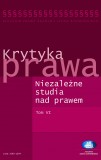Procedury alternatywnego rozwiązywania sporów sądowych w Stanach Zjednoczonych
Alternative Dispute Resolution procedures in the United States of America
Author(s): Magdalena BentkowskaSubject(s): Civil Law, Labor relations, Criminology
Published by: Akademia Leona Koźmińskiego
Keywords: ADR; alternative dispute resolution; alternative resolution of court disputes;
Summary/Abstract: The forms of the Alternative Dispute Resolution (ADR) procedures were developed in the 1960s in the United States. The ADR is based on conciliation of the parties rather than judgement. This is possible through ensuring of broad participation of the parties in the dispute resolution. The ADR has as its objective the replacement of the adjudication process by forms of arbitration, contract, mediation and conciliation. The goal is to reach a compromise. The basic division of the ADR is into the basic and the mixed (hybrid) forms. The basic ones include mediation, negotiations and arbitration. The hybrid forms include, for example, conciliation, fact finding, mini-trial. The ADR tools are successfully used for solving disputes in civil law, labour law, and administrative law and even in criminal cases. American agencies also apply ADR procedure called reg-neg to work out the content of legal regulations between officials and representatives of the parties concerned. ADR forms are also used in appeal proceedings. Despite unquestionable advantages of the ADR methods, there are critics who blame them for lowering the standard of the judiciary. There is no doubt that the application of ADR results in de-formalisation and simplification of the court proceedings and often in delegating the position of a negotiator or mediator to people without a legal background. However, this should not overshadow the greatest asset of the ADR, namely, the achievement of permanent agreements satisfactory for both parties.
Journal: Krytyka Prawa
- Issue Year: 6/2014
- Issue No: 1
- Page Range: 149-163
- Page Count: 15
- Language: Polish

